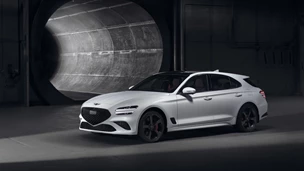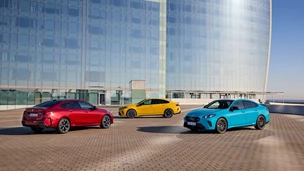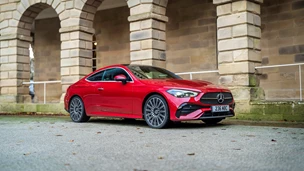The RS 7 is the high-performance version of the Audi A7 Sportback. It uses the same powertrain as the RS 6 Avant, with a 4-litre 552bhp cylinder-on-demand B8 turbo petrol engine driving all four wheels through an eight-speed automatic gearbox. Though not as practical as the Avant, its hatchback body style means that it still has quite a lot of luggage space.
That body shape essentially puts the Audi in a class of its own. BMW, Jaguar and Mercedes make similarly powerful versions of the 5-Series, XF and E-Class, but none of these is available in hatchback form.
Performance
Despite being slightly lighter than the RS 6 Avant, the RS 7 has the same 0-62mph time of 3.9 seconds. Its top speed is normally limited to 155mph, but option packs allow you to have this raised to 174mph or 189mph, a feature which is more of conversational than of practical use unless you live in Germany.
As well as performing superbly well at full throttle, the engine is exceptionally flexible. Very rapid acceleration is available almost instantly.
When pushed hard, the engine sounds quite wonderful. In gentle driving it's very quiet, particularly when the cylinder-on-demand technology (introduced to improve fuel economy and lower official CO2 emissions) shuts down four of the eight cylinders when only a little power is required. It should be possible to detect the change of tone, but in practice the engine note is all but drowned out by road noise in these situations so it's almost impossible to tell the difference.
Ride and Handling
The standard brakes are perfectly suitable for the amount of performance you can use on public roads.
The RS 7 has more than enough grip even for track work, never mind road use, and along with the division of power among all four wheels this means it can be given full throttle far earlier in a corner than a much less powerful hot hatch. Making either the front or rear tyres break traction is exceptionally difficult. The road behaviour is good, but oddly not quite as impressive as that of the RS 6 Avant, which settles into the tarmac better despite its more compromised rear suspension. The standard brakes are perfectly suitable for the amount of performance you can use on public roads, but if you expect to give them a real hammering on a regular basis it's worth considering the optional ceramic discs. Another possible diversion from the normal specification is to swap from adaptive air suspension to a more conventional set-up with Dynamic Ride Control, though the former does its job superbly well.
Interior and Equipment
The RS 7's MLB platform is the basis of a wide variety of models with longitudinally mounted engines, including the A4, the A8 and the Porsche Macan. No other companies within the Volkswagen Group currently use it.
With the rear seats in place, the RS 7 has a luggage capacity of 535 litres, five less than the Mercedes E-Class and Jaguar XF saloons and 15 more than the BMW 5-Series. Unlike them, however, the Audi can have its practicality enhanced by folding down those seats, at which point the load space increases to 1,390 litres - certainly less than the estate cars, but better than you could hope to achieve in the saloons. Standard equipment includes leather upholstery, DAB digital radio, a head-up display, Bose surround-sound audio, four-zone automatic air-conditioning, a sunroof and Audi's drive select system, which allows you to change the car's character to some extent. A tyre repair kit takes the place of any kind of spare wheel, unfortunately.
Cost
The cylinder-on-demand technology helps the car to achieve 29.7mpg on the EU test (it would be around 28mpg otherwise), while CO2 emissions are 221g/km.
Without options, the RS 7 costs £84,525, a figure which doesn't look good alongside the RS 6 Avant's £78,790. The difference would be easier to understand if the RS 7 were clearly the better car to drive, but as already discussed it isn't. The cylinder-on-demand technology helps the car to achieve 29.7mpg on the EU test (it would be around 28mpg otherwise), while CO2 emissions are 221g/km. Vehicle Excise Duty will therefore cost £290 annually from year two onwards. The Benefit In Kind tax rating is 37%, and will remain so until at least early April 2020.
Our Verdict
If you've already driven an RS 6 Avant, the RS 7 may feel slightly disappointing (unless you feel that it's worth nearly £6,000 not to be seen driving an estate), but there's no arguing that it's a very fast car with no shortage of grip. While it may not be Audi's most impressive model with this sort of power output, it's nevertheless exceptional in a wide range of driving conditions, particularly those which allow you to revel in the sound it makes when you're unleashing its full potential.




